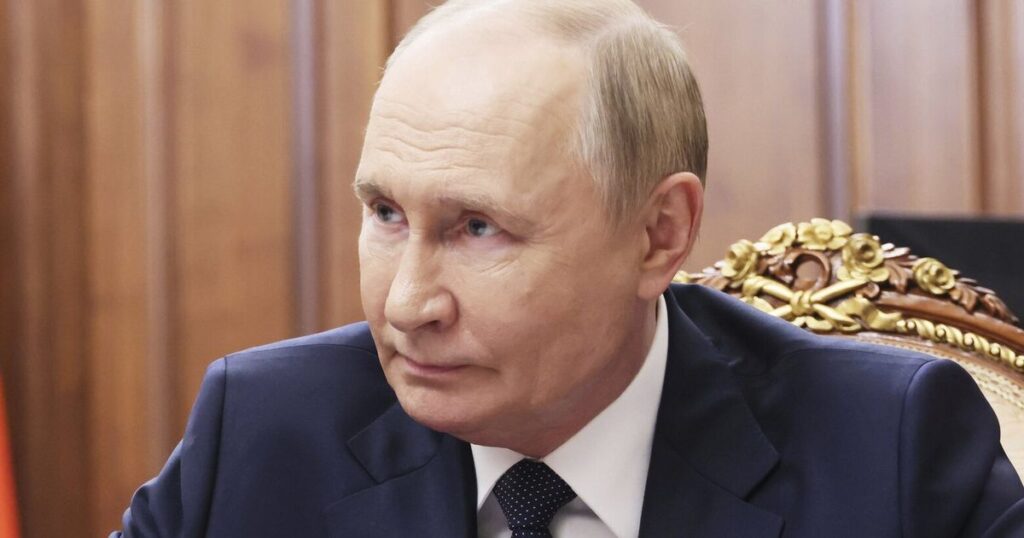BERLIN — Russia will no longer abide by a defunct treaty prohibiting the deployment of intermediate-range missiles, the country’s Foreign Ministry announced Monday.
But Washington has accused Moscow of violating the pact for over a decade, and Russia has been known to use missiles with ranges banned by the treaty during its war against Ukraine.
In a statement, the Russian Foreign Ministry said that Moscow “no longer considers itself bound” by its “previously adopted self restrictions” under the Intermediate-range Nuclear Forces Treaty, noting that the United States was moving to deploy intermediate-range missiles in Europe and Asia.
The U.S. Defense Department did not immediately comment on the Foreign Ministry’s statement Monday.
The 1987 pact, also known as the INF Treaty, banned ground-launched ballistic and cruise missiles with ranges of 500 to 5,500 kilometers (311 to 3,418 miles). As a result, more than 2,600 Soviet and U.S. missiles were eliminated, in what was seen as a Cold War breakthrough.
In 2019, during President Donald Trump’s first term, the United States pulled out of the agreement. The Trump administration argued that Russia had long been violating the treaty with the deployment of 9M729 cruise missiles, also known as SSC-8 missiles. Russia denied any knowledge of the violations.
Accusations of Russian violations date to 2014, when the Obama administration raised them.
Moscow’s announcement Monday came three days after Trump ordered the repositioning of two U.S. nuclear submarines in response to a nuclear threat made online by Dmitry Medvedev, the former Russian president who is deputy chair of the country’s security council.
In a post on social media platform X later Monday, Medvedev highlighted the Foreign Ministry’s announcement, which he blamed on what he called the anti-Russia policy of NATO countries, and he warned, “Expect further steps.”
The ministry’s statement did not mention Moscow’s use in November of the Oreshnik intermediate-range ballistic missile against a city in Ukraine. The Oreshnik has a range that violates the INF Treaty.
Russian President Vladimir Putin confirmed Friday that the Oreshnik had entered service and would be deployed to Belarus, which shares a border with three NATO countries. The missile is capable of carrying nuclear warheads.
Last year, the United States announced that Washington would begin “episodic deployments” of intermediate-range missiles in Germany starting in 2026. Russia vowed countermeasures.
The announced collapse of the INF Treaty and tensions with Russia over Ukraine have raised worries in the West of a return to a dangerous Cold War-style arms race, in which extremely fast Russian missiles armed with nuclear weapons could reach European capitals in a matter of minutes, with little warning or ability to mount a defense. Russian news media have bragged that the Oreshnik could reach Ramstein Air Base in Germany in just 15 minutes.
Upon withdrawing from the INF Treaty, the United States said that essentially Washington had been adhering to the pact’s restrictions unilaterally. By then, the Pentagon had grown uncomfortable with the treaty’s limits. Adhering to the pact meant the United States could not deploy any midrange missiles in Asia, which would be a crucial part of any effort to defend Taiwan, the self-governing island that China has long claimed as its own.
In its statement Monday, Russia’s Foreign Ministry said that as the United States and its allies were moving toward the deployment of intermediate-range missiles in Europe and Asia, conditions for what it called its “unilateral moratorium on the deployment of similar weapons” were no longer in place.
The statement came as Trump’s special envoy for the Middle East, Steve Witkoff, prepared to visit Moscow this week to discuss possibilities for peace with Ukraine. Trump has threatened to apply tariffs on Russia and secondary tariffs on its oil buyers if Putin doesn’t agree to a ceasefire by the end of the week.
The Kremlin has refrained from issuing threats in response, in contrast to the remarks by Medvedev, who regularly makes bombastic comments online and isn’t seen as speaking for Putin.
On Monday, Kremlin spokesperson Dmitry Peskov played down Trump’s decision to reposition submarines.
“Russia treats the issue of nuclear nonproliferation with great care, and we believe everyone should be extremely cautious with nuclear rhetoric,” Peskov told reporters. He noted that U.S. submarines were regularly on combat duty. “We don’t believe this is a case of any sort of escalation,” he said.
The only major arms control agreement left in place between Moscow and Washington is the New START Treaty, but Putin announced in 2023 that Russia was suspending its participation in that pact. The treaty expires next year.
Phil Breedlove, a retired U.S. Air Force general who led U.S. European Command from 2013-16, said he wasn’t surprised that Russia had announced the move shortly after Trump threatened to get tough on Moscow over the conflict in Ukraine.
“This is a fairly standard approach Russia takes when they’re trying to deter or intimidate the West,” Breedlove said. “Every time the West considers a change, like giving new weapons to Ukraine, this is what happens.”

